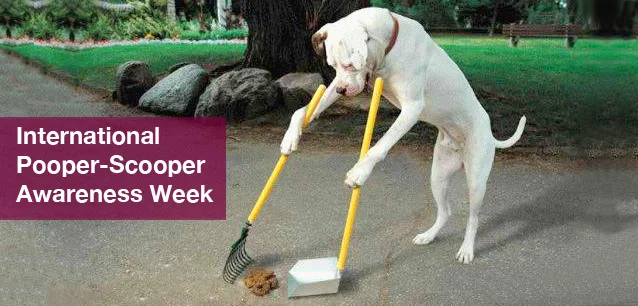 AD
AD
Today is: December 29
Scroll to explore events active on this date.
LEEP INK FEATURES

August? Absolutely!
In August, we live through the Dog Days of Summer. It's hot and often humid, and those who can leave for better climates do. Down south, winter is in full force. August is also known as "the ...

In The Heat of July: July 2025 Events
Is it hot enough (or cold enough if you're below the equator) for you yet? There is actually a day for that! Like every month, I pick a diverse collection of events you may or may not know about. This ...

May Blooms: Events in May 2025
Along with October, May is one of the most densely packed months of the year. It's before the summer humidity and the last whole month of the school year. The weather is warming in t...
About International Pooper Scooper Week
Health
Ends: Apr 07, 2024
DESCRIPTION:
The Association of Professional Animal Waste Specialists (aPaws), founded in February 2002, has established a special week of educating pet owners on the importance of cleaning up after their dogs. With the week in full swing, pet owners should be aware of the problems concerning dog waste. The American Pet association estimates that this country’s seventy-one million pet dogs produce over 4.4 billion pounds of waste annually. That’s enough to cover 900 football fields with 12 inches of dog waste!
Dog feces presents more than a nuisance; pet waste can pose a severe health hazard.
Why?
Several common parasites, including roundworms, are transmitted via dog feces. When infected dog droppings fester on the ground, the eggs of the roundworms and other parasites can linger in the soil for years. As a result, anyone who comes in contact with the soil also comes in contact with the infected eggs.
Children run the most significant risk of infection because they’re prone to play in the dirt at the park or playground and then put their hands in their mouths or rub their eyes with their hands. But even a group of teens or adults playing Frisbee or touch football in an open area could be in danger. Parasitic infections can make humans extremely sick, and for pregnant women, these infections pose a serious risk to their unborn children.
VIDEOS
ADDITIONAL IMAGES
Currently, this event does not have supporting images.
Where would you like to go now?
 AD
AD



/footer-logo.svg)
